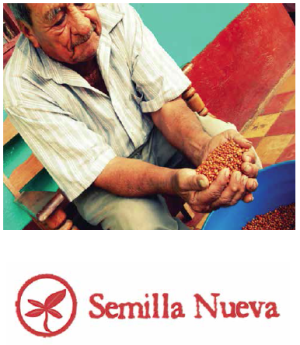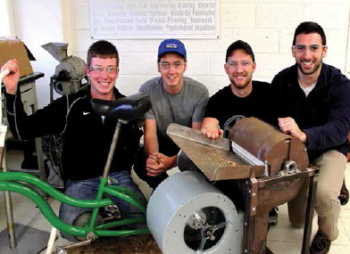Mechanical Engineering
International Projects
ME 491 International Humanitarian Engineering is a design-intensive interdisciplinary course in which teams of students address the challenges of creating new products that enhance the lives of the poor, while respecting their social, cultural and ethical identities.
The following project will be on display during Design Day from 9:00 until noon in the 1200 Hallway of the Engineering building:
Semilla Nueva: Portable Pigeon-pea Thresher
Semilla Nueva is a non-governmental organization (NGO) in Quetzaltenango, Guatemala, dedicated to helping rural farmers discover a path to prosperity, health, and sustainability through sustainable agriculture technologies and farmer-to-farmer education. One of their more recent projects is the introduction of a potential new industry featuring a crop native to India: pigeon-pea. This legume is being introduced to the local culture to serve as a permaculture crop which has the potential to have both nutritional and economic impacts. Pigeon-pea is extremely rich in protein, fibers and essential micronutrients to help combat malnutrition problems. Economically, a new crop will provide an enhanced income stream for struggling smallholding farmers in addition to their traditional produce such as corn.
 Current harvesting practices are both brutally labor intensive and time-consuming as the crop is beaten by hand in order to break open the pods to release the peas for collection. The objective of this rigorous humanitarian engineering project is to provide impoverished farmers in Guatemala with an innovative, low-cost, human-powered portable thresher that increases current pigeon-pea production as well as to develop a device that is not only affordable to smallholder farmers but is easily manufacturable.
Current harvesting practices are both brutally labor intensive and time-consuming as the crop is beaten by hand in order to break open the pods to release the peas for collection. The objective of this rigorous humanitarian engineering project is to provide impoverished farmers in Guatemala with an innovative, low-cost, human-powered portable thresher that increases current pigeon-pea production as well as to develop a device that is not only affordable to smallholder farmers but is easily manufacturable.
While the engineering development of the threshing machine has been crucial, the 2014 Fall semester’s focus also encompassed the diffusion of this innovation in Latin America. The latter objective entailed collaboration between the College of Engineering and other colleges, most notably the College of Agriculture, to aid in the support of this international multidisciplinary project and its success in Guatemala. Financial support was also a key for the team’s international travel and shipping costs. Being awarded a competitive grant has helped with the latter objective. The realization of this project has been a direct result of the overwhelming dedication by all involved and the overall objective of using our knowledge and skills for the betterment of the world.
